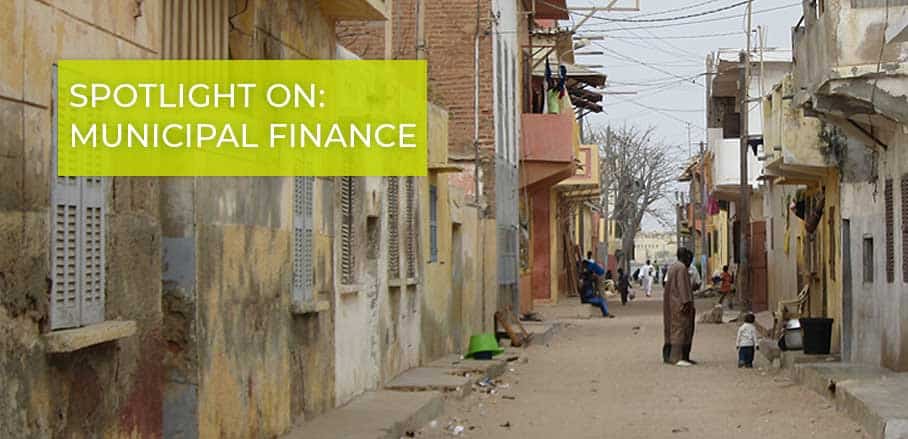Boosting Urban Development in Africa Through New Mechanisms of Financing
With the sectors for development and finance closely intertwined, a municipality’s financing mechanism of choice significantly influences its development path. Khady Sarr, Programme Director of the Dakar Municipal Finance Programme, outlines several models and explains the advantages of bond loans – for municipalities and investors alike.
With the sectors for development and finance closely intertwined, a municipality’s financing mechanism of choice significantly influences its development path. Khady Sarr, Programme Director of the Dakar Municipal Finance Programme, outlines several models and explains the advantages of bond loans – for municipalities and investors alike.
In Africa, the delay in the socioeconomic take-off of territories has one main reason: a lack of effective public policies. The mismatch between the missions entrusted to local communities and the financial means available for their implementation exposes real difficulties in dealing with the many development challenges.
The acceleration of urbanisation in African territories has generated a great need for investment in infrastructure. It is therefore not only imperative to rethink governance models so that they best meet the requirements of sustainable local development – based on controlled strategy planning and citizen participation – but also to reflect on innovative financing strategies and mechanisms that are adapted to meet the investment needs of local authorities.
Which Financial Instruments Can Meet the Needs of Local Government Bodies?
All African municipalities face challenges of acquiring financial resources to manage the pressures of growth and high population density, and of developing their capacity to carry out innovative and structuring projects that reduce the urban infrastructure deficit.
Developing new financing mechanisms is difficult, however, as potential lenders perceive municipalities’ chance of insolvency as significant risk, and as local capacities (human resources, financial tools, internal planning policy) tend to be insufficient.
Formerly focussed on support from the North-South cooperation in their development efforts, African cities are now opening up to local and international financial markets. There are various tools available that, depending on the nature of the project to be financed, feature various advantages and disadvantages.
Three loan mechanisms are commonly used:
Commercial lending by local banks. This has several constraints, including difficult access to borrowing, short maturity, and very high interest rates.
Concessional loan by international public or private development organisations such as the French Development Agency (AFD) and the West African Development Bank (BOAD). This is more suitable for local authorities than loans by commercial banks given the available amounts, interest rates, and maturities. However, these types of loans are becoming increasingly difficult to obtain with the drastic drop in development aid.
Bond loan by local, regional, or international financial market. A public call for bond borrowing has many advantages, especially compared to conventional bank loans. Indeed, in addition to offering very competitive interest rates and much longer maturities, this option allows the borrower to mobilise significant resources according to his needs and according to its terms.
Beyond the mobilisation of resources, the bond loan positively influences the public image of the issuing entity, as this type of loan commonly imposes both transparency standards and standards of procedures making for positive interactions with other market players (private sector, savers, and management and intermediation companies).
Above all, bond loans represent the advent of a “new relational relationship” between the saving citizen (natural or legal person) and the development of his/her city. More than simply an option for tax deduction, the municipality’s obligation to the investor represents a doubly advantageous choice for him/her: a competitive interest rate and active participation in the construction of a suitable living environment.
However, while bond borrowing has certain advantages over other instruments, its use tends to be very limited in many sub-Saharan countries by a lack of autonomy of municipal governments as well as by insufficient communication and collaboration between federal and municipal governments.
The case of Dakar is a perfect illustration of this problem. Without reason, the bond was terminated by the central government on the eve of its launch through withdrawal of the no objection notice from the contract.
Municipal Investment Finance (MIF) Programmes and their Effects on Local Government
MIF programmes support municipalities in mobilising capital investment and gaining access to financial market. They do, however, require both a favourable legal environment and adequate financial and human resources such as solvency of issuers, profitability of the operation, and well-trained administrative and technical staff.
As a result of these requirements, the MIF process enables the community to test and strengthen its planning and financial management skills through better control of its taxation, but also encourages better management of its human resources.
The City of Dakar has successfully led its municipal finance programme with the help of several financial partners, mainly the Bill and Melinda Gates Foundation. The example shows that the development issues of local territories are closely linked to issues in local finances. With the positive effects on the City’s financial management shown in its credit rating, Dakar is developing more opportunities to finance its needs; investors are more comfortable in dealing with the City.
To introduce a MIF programme to the municipality of Dakar has proven to be a valid and appropriate answer to the capital’s need to carry out social programs and structuring projects that are aimed at increasing the level of urban functionality and at boosting citizen participation.
Ultimately, a well-articulated MIF programme will mitigate the constraints rooted in the relation between municipal and federal governments as well as positively influence the picture of the respective local governments that are generally perceived as institutions without guarantees and with many problems of solvency.
The purpose of the MIF program will be to connect credible and solvent municipalities with their local private sector and international investors to finance structuring projects with a high social and economic impact, constituting an important step towards the sustainable development of African cities.
